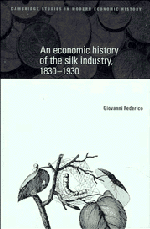Book contents
- Frontmatter
- Contents
- List of illustrations
- List of tables
- Forward and acknowledgments
- List of abbreviations
- 1 Introduction
- 2 The characteristics of the industry
- 3 The growth in the long run
- 4 Consumption of silkwares and demand for silk
- 5 The demand for silk: an analysis by country
- 6 The roots of growth: agricultural production
- 7 The industry: technical progress and structural change
- 8 Institutions and competitiveness: the markets
- 9 Institutions and competitiveness: the state
- 10 Conclusions
- Statistical appendix
- References
- Index
8 - Institutions and competitiveness: the markets
Published online by Cambridge University Press: 29 January 2010
- Frontmatter
- Contents
- List of illustrations
- List of tables
- Forward and acknowledgments
- List of abbreviations
- 1 Introduction
- 2 The characteristics of the industry
- 3 The growth in the long run
- 4 Consumption of silkwares and demand for silk
- 5 The demand for silk: an analysis by country
- 6 The roots of growth: agricultural production
- 7 The industry: technical progress and structural change
- 8 Institutions and competitiveness: the markets
- 9 Institutions and competitiveness: the state
- 10 Conclusions
- Statistical appendix
- References
- Index
Summary
Introduction: what are institutions and why do they matter?
The term ‘market institutions’ in this chapter denotes the set of procedures which regulated the exchanges of cocoons, silk and other related goods (silkworm eggs, mulberry leaves etc.) and the provision of credit to finance these exchanges. Potentially, they did matter a lot, first and foremost because they determined the level of transaction costs. From the producers’ point of view (peasants and reeling firms), these were net liabilities, to be deducted from the market price of silk to get the factory price of silk or the farmgate price of cocoons. Therefore, ceteris paribus the lower these costs, the higher the output of the country. Besides, the institutions influenced the allocation of risk and the circulation of information. The more the institutions were favourable to the development of the silk industry, the more they succeeded in allocating the risk to people ready to bear it and in making the information available to all interested parties. The issue is relevant for the analysis to the extent that institutions differed from country to country – and that the differences affected competitiveness. This chapter tries to assess the extent of these differences, using a descriptive approach. In fact, some of the costs of inefficiency, such as the deadweight loss of possible limitations to competition or the losses due to imperfect information, are difficult to measure. Others, such as the brokers’ mark-ups and the interest rates could be easily compared, had the relevant data been available. Unfortunately, the quantitative evidence is scarce.
- Type
- Chapter
- Information
- An Economic History of the Silk Industry, 1830–1930 , pp. 146 - 173Publisher: Cambridge University PressPrint publication year: 1997

